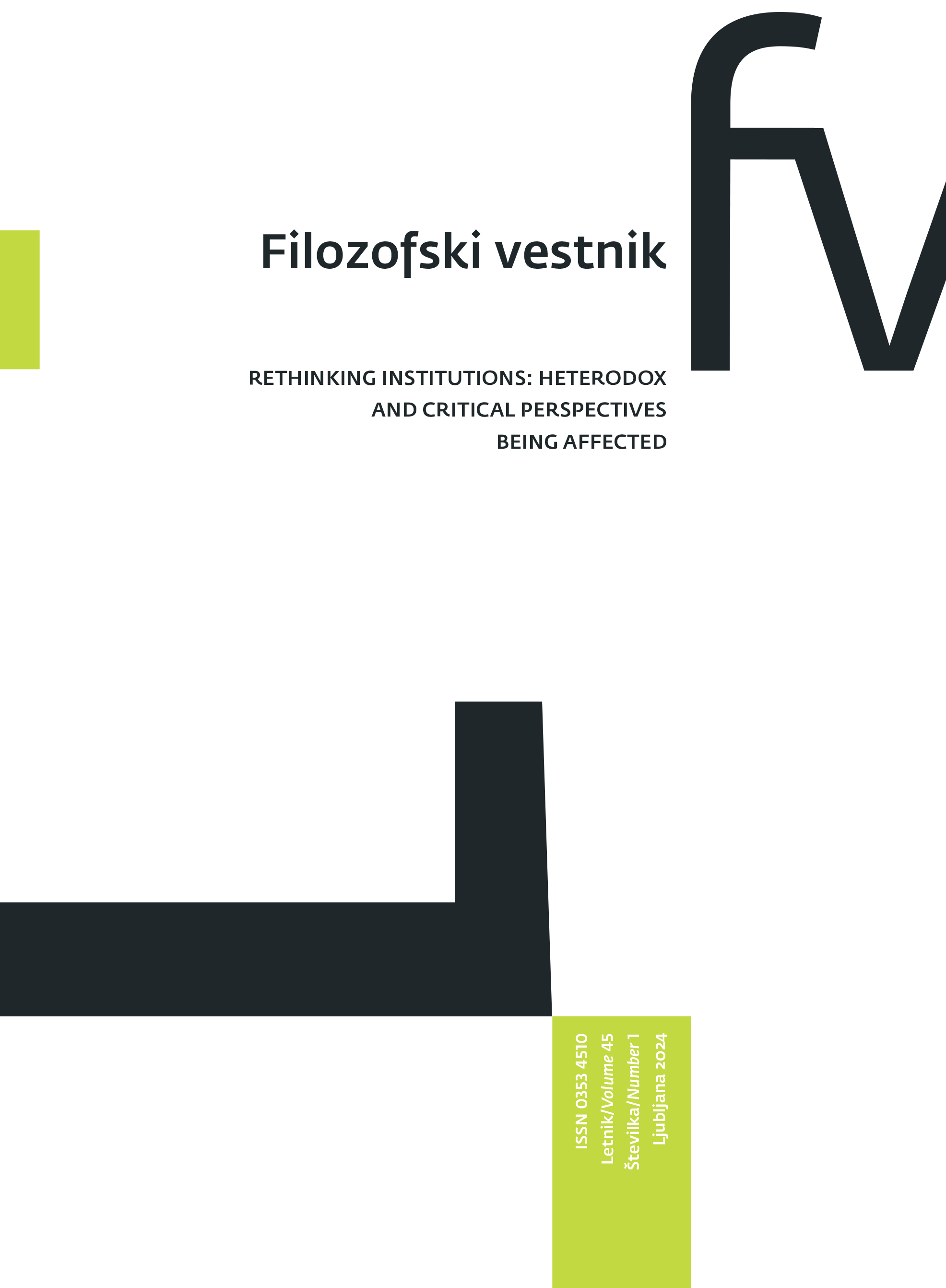Interval and Event
The Present as In-between Time in Gilles Deleuze and Alain Badiou
DOI:
https://doi.org/10.3986/fv.45.1.10Keywords:
time, event, present, contemporary, politics, Alain Badiou, Gilles DeleuzeAbstract
Are we living in an “in-between time”? If so, what does it mean to be the “contemporary” of such a time? Starting from its consistent recurrence over different times, this article investigates the temporal-philosophical operation related to the designation of “in-between times.” It examines the function this operation assumes in thinking about time, i.e. the specific construction of time it establishes. By focusing on the functioning of intervalle in Alain Badiou and entre-temps in Gilles Deleuze, two contradictory relations to the present conveyed in the concept of “in-between time” are discussed. The article demonstrates that for both philosophers, in-betweenness occupies a key position in their philosophical construction of time—yet, in reverse form in each case. The discussion of this contrasting mode then leads to the final question of whether there is such a thing as a fundamental in-between character that manifests itself through all times, belonging to time as such.
Downloads
References
Badiou, Alain. The Century. Translated by Alberto Toscano. Cambridge: Polity, 2007.
Badiou, Alain. Images of the Present Time, 2001–2004. Translated by Susan Spitzer. New York: Columbia University Press, 2023.
Badiou, Alain. Logics of Worlds: Being and Event, 2. Translated by Alberto Toscano. London: Continuum, 2009.
Benčin, Rok. “Rethinking Representation in Ontology and Aesthetics via Badiou and Rancière.” Theory, Culture and Society 36, no. 5 (September 2019): 95–112. https://doi.org/10.1177/0263276418806573.
Deleuze, Gilles. The Logic of Sense. Translated by Mark Lester and Charles Stivale. Edited by Constantin V. Boundas. New York: Columbia University Press, 1990.
Deleuze, Gilles, and Félix Guattari. What is Philosophy? Translated by Hugh Tomlinson and Graham Burchell. New York: Columbia University Press, 1994.
Diefenbach, Katja. “Über das Un/Sinnliche. Ereignis- und Zeitbegriffe in Deleuzes und Badious Ontologien unendlicher Mannigfaltigkeit.” In “Sensibilität der Gegenwart. Wahrnehmung, Ethik und politische Sensibilisierung im Kontext westlicher Gewaltgeschichte,” ed. B. Liebsch, 151–76. Special issue, Zeitschrift für Ästhetik und Allgemeine Kunstwissenschaft 17 (2018).
Gramsci, Antonio. Selections from the Prison Notebooks. Edited and translated by Quintin Hoare and Geoffrey Nowell Smith. New York: International Publishers, 1992.
Groys, Boris. “Comrades of Time.” In E-flux Journal: What is Contemporary Art?, edited by Julieta Aranda, Brian Kuan Wood, and Anton Vidokle, 22–39. Berlin: Sternberg Press, 2010.
Hardt, Michael. Gilles Deleuze: An Apprenticeship in Philosophy. Minneapolis: University of Minnesota Press, 1993.
Nietzsche, Friedrich. Human, All Too Human, I: A Book for Free Spirits. Translated by Gary Handwerk. Vol. 3 of The Complete Works of Friedrich Nietzsche. Stanford: Stanford University Press, 1997.
Nietzsche, Friedrich. Nachgelassene Fragmente, 1880–1882. Edited by Giorgio Colli and Mazzino Montinari. Vol. 9 of Kritische Studienausgabe. Munich: Deutscher Taschenbuch Verlag, 1988.
Nietzsche, Friedrich. “On the Utility and Liability of History for Life.” In Unfashionable Observations, translated by Richard T. Gray, 83–167. Stanford: Stanford University Press, 1995.
Nietzsche, Friedrich. Thus Spoke Zarathustra. A Book for All and None. Edited by Adrian Del Caro and Robert B. Pippin. Translated by Adrian Del Caro. Cambridge: Cambridge University Press, 2006.
Völker, Jan. “Das demokratische Subjekt und die Korruption der Zeit.” In Absolute Gegenwart, edited by Marcus Quent, 28–48. Berlin: Merve, 2016.
Williams, James. Gilles Deleuze’s Philosophy of Time. Edinburgh: Edinburgh University Press, 2011.
Šumič Riha, Jelica. “Contemporary Thought and the Crisis of Negation.” Crisis and Critique 1, no. 3 (July 2014): 59–83.
Downloads
Published
How to Cite
Issue
Section
License
Copyright (c) 2024 Authors

This work is licensed under a Creative Commons Attribution-ShareAlike 4.0 International License.
Authors guarantee that the work is their own original creation and does not infringe any statutory or common-law copyright or any proprietary right of any third party. In case of claims by third parties, authors commit their self to defend the interests of the publisher, and shall cover any potential costs.
More in: Submission chapter





